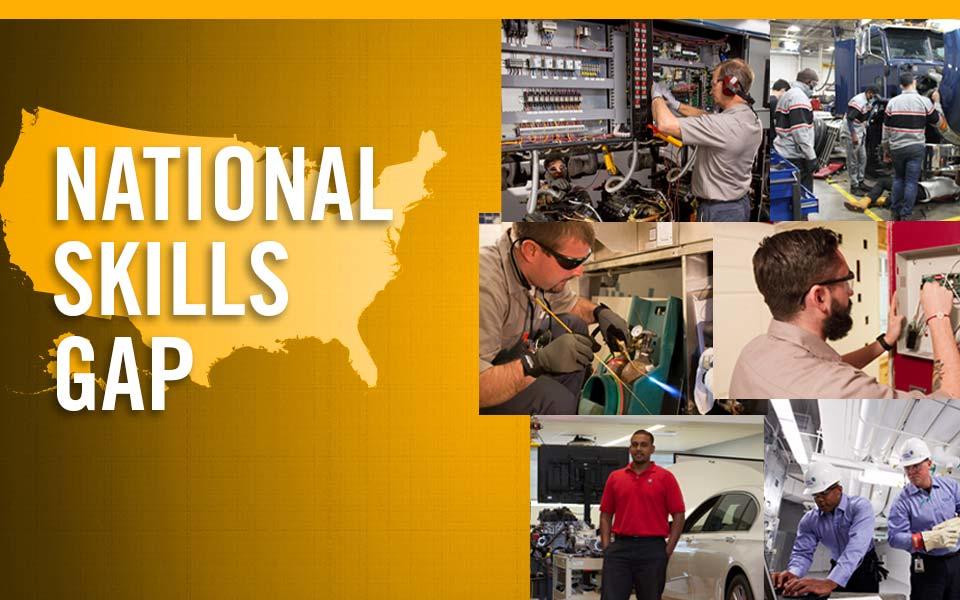The National Skills Gap Is a Crisis of America’s Own Creation

The 20th century produced so many life-changing technologies, that it can be safely defined as the age that ushered the human race into the modern era. From the discovery of flight to the invention of television, the 20th century produced new and exciting products at a blistering pace for mass consumption. And with these advancements came the need to maintain, repair and update these technologies by skilled individuals. The modern trades career was born in this era, and these advancements relied solidly on domestic talent to keep them running. Newly produced items such as air conditioning, refrigeration, safe and capable transportation, medical implants and advanced electronics were heralded as must-have technologies.
At some point in the late 20th century, these must-have advancements became routine expectations, and public education began putting less emphasis on skilled trades work. Many high schools stopped offering “shop class” and began pushing students towards earning a four-year college degree as the default expectation. Many high schools even dismantled their industrial arts departments, which ended the ability for students to sample the trades and make more informed decisions about their career pathway. It also created an unspoken rule that college was the only acceptable option for the newest generations.
The Misguided Stigma About the Skilled Trades
With this sea of change rose the stigma that trade schools were only for people who couldn’t succeed in college, and it inferred that non-college graduates would be somehow less successful people. This myth has revealed itself as not only being economically shortsighted, but being factually wrong. The skilled tradesperson has always been of vital importance, but that point somehow became obscured. And America is now learning that fact the hard way.
This shortsightedness has revealed itself in the first quarter of the 21st century, and its effects are felt across all sectors of the economy. Industries are experiencing shortages of skilled workers to the point where their economic expansion is under threat. Many important government and industry leaders have been extremely vocal in the news about this looming crisis, and yet public schools have appeared reticent to recognize this issue.
The Skills Gap Is a Massive Opportunity for Those Who Want to Learn a Trade and Work

Mike Rowe, who has been a highly visible and vocal public figure in the industrial sector, runs the Mike Rowe Works Foundation. His organization is dedicated to helping people rediscover the skilled trades, and understand the importance of developing marketable skills, work ethic, self-reliance and experience.
It is these important skills that trade schools like Lincoln Tech can help an individual develop. There are so many specific skills needed in today’s high-tech marketplace, and many of them begin with training programs that take about one year to complete, and at a fraction of the cost of a four-year college degree. With a trade school education, workers can enter the workforce and be immediately useful and productive.
The important takeaway is that focused training in specific skills will solve the national skills gap, and that type of training is simply not available at most four-year colleges.
High-Demand Skills Are Needed To Fill The Skills Gap
In the chart below, we look at eight in-demand skilled occupations, and the job growth projected for these positions.
The best way to determine job demand is to look directly at the official sources for occupational information. The charts below are aggregated directly from O*NET OnLine, which obtains its data directly from the US Bureau of Labor Statistics.
Using the chart below, plug in the “Occupation code” into the Search by Occupation field on O*NET OnLine, and the results will be displayed on the page. This will show you everything you need to know about job demand for that particular career field. It also supplies excellent information regarding certifications, wages and related job fields for the training you wish to pursue.
Job Demand for Skilled Technicians in the United States (Data Retrieved on May 15, 2023 from O*NETOnLine.org) | |||||
Lincoln Tech Program | Occupation Code | 2021 | 2031 | **Projected Additional Annual Job Openings | |
| Automotive Technicians | 49-3023 | 733,200 | 743,800 | 73,300 | |
| Diesel Technicians | 49-3031 | 293,200 | 305,800 | 28,500 | |
| Collision Repair & Refinishing Technicians | 49-3021 | 152,500 | 156,800 | 15,200 | |
| Heavy Equipment Technicians | 49-3042 | 152,600 | 164,200 | 16,300 | |
| HVAC Technicians | 49-9021 | 394,100 | 414,400 | 40,100 | |
| Electricians & Electrical Systems Technician | 47-2111 | 711,200 | 761,400 | 79,900 | |
| Machining & Manufacturing (CNC Tool Programmers) | 51-9162 | 26,200 | 31,800 | 3,600 | |
| Welders | 51-4121 | 428,000 | 434,900 | 47,600 | |
| TOTALS: | 2,891,500 | 3,013,100 | 304,500 | ||
** Projected additional annual job openings refers to the average annual job openings due to growth and net replacement.
The Skills Gap Can Translate Into Opportunity
The infographic above shows that just these eight occupations are expecting at least a 10% increase in job openings over the next decade1. All of the above fields have employers that also offer advanced proprietary training, and are in desperate need of hiring new technicians to replace those who are retiring or moving to other employment. Lincoln Tech specializes in providing high quality skilled training, and also has partnerships with major manufacturers and service organizations to train qualified individuals in advanced proprietary technologies.
There are so many fields and employers facing this crisis leaving no doubt that a national skilled employee shortage exists; and it has been referred to, in both industry and the news, as the Skills Gap. In short, the United States does not currently produce nearly enough skilled tradespeople as it actually needs, so the demand to fill career trades of all kinds goes unfulfilled. Employers continue to struggle without enough skilled individuals to fill the positions they need to fill, and are willing to pay competitive wages to secure highly skilled and eager individuals.
Lincoln Tech is dedicated to helping fix the skills gap by offering many excellent career training options in the auto-diesel and skilled trades industries, all of which are projected to have positive growth in job demand for at least the next decade.
Please feel free to contact Lincoln Tech to learn more.
1 Increase in job openings is calculated as (Projected Annual Job Openings / total 2031 job openings) expressed as a percentage. Formula: 304,500 / 3,013,100 = 0.10105 which is 10.1%).

